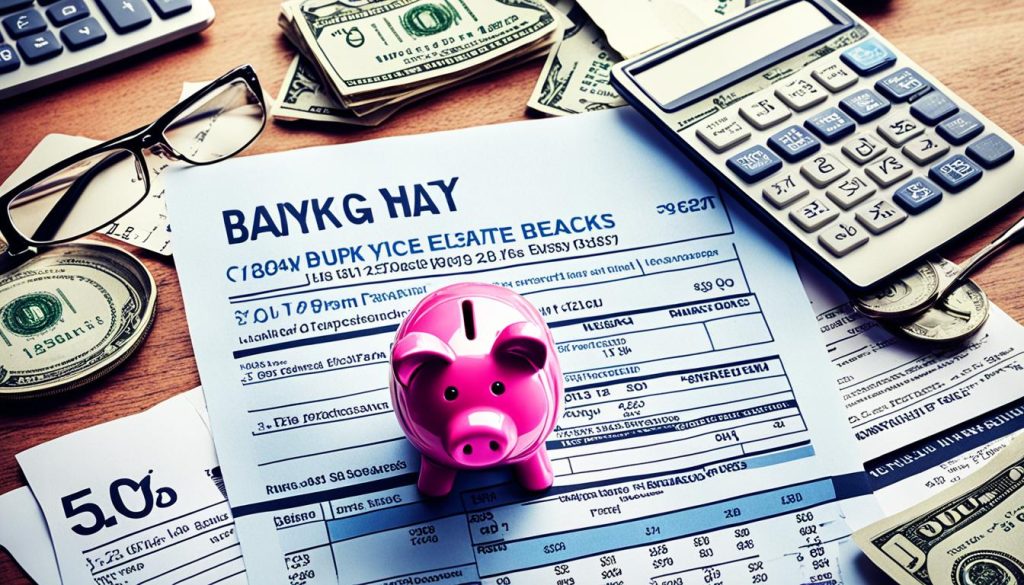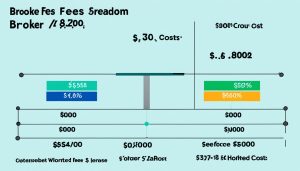Demystifying New York Real Estate with Unraveling Broker Fees and Associated Expenses
Welcome to our comprehensive guide on New York real estate broker fees and associated expenses. If you’re considering buying or selling a property in the Big Apple, understanding the commission structure for brokers and brokerage fees in NY is critical. In this article, we’ll delve into the details of these costs, helping you navigate the competitive New York real estate market with confidence.
Key Takeaways:
- Broker fees in New York can range from 4% to 6% of the property’s purchase price.
- These fees are typically split between the listing agent and the buyer’s agent.
- It’s important to negotiate and understand the breakdown of the commission to ensure a fair deal.
- In addition to broker fees, there may be other expenses associated with hiring a real estate agent in NYC.
- Alternative options, such as discount brokers and flat-fee brokers, can help save on broker fees while providing essential services.
Understanding New York Real Estate Broker Fees
New York real estate broker fees play a crucial role in the buying and selling process. To make informed decisions when engaging a real estate agent in NYC, it’s essential for home buyers and sellers to understand the intricacies of these fees.
Broker fees in New York can vary based on several factors, including the property’s purchase price and the services provided by the broker. Typically, these fees range from 4% to 6% of the property’s purchase price.
The fee is usually split between the listing agent, who represents the seller, and the buyer’s agent. This division ensures that both parties are compensated for their services and incentivizes them to work towards a successful transaction.
Understanding broker fees is essential for buyers and sellers to effectively budget and negotiate in the real estate market. By being familiar with these fees, individuals can compare different agents and their associated costs before making a decision.
Commission Structure for Brokers in New York
When it comes to real estate transactions in New York, understanding the commission structure for brokers is essential. Broker fees in New York are typically calculated as a percentage of the property’s purchase price. On average, NY real estate broker commissions range from 4% to 6% of the sale price.
In a traditional real estate transaction, the commission is divided between the buyer’s agent and the seller’s agent. Both agents share the responsibility of representing their respective clients and facilitating the transaction. Negotiating these fees is crucial for home buyers and sellers to ensure they are getting a fair deal.
Take a look at the breakdown of a typical commission structure:
| Agent | Commission Percentage |
|---|---|
| Buyer’s Agent | 2% – 3% |
| Seller’s Agent | 2% – 3% |
It’s important to note that these percentages may vary depending on the specific circumstances of the transaction and the negotiation between the parties involved. The commission structure may also differ for commercial real estate transactions.
By understanding the commission structure, home buyers and sellers can make informed decisions and effectively negotiate with their real estate agents. It’s essential to discuss these fees upfront and ensure transparency regarding how the commission will be split between the agents.
“Negotiating these fees is crucial for home buyers and sellers to ensure they are getting a fair deal.”
While commission fees may seem significant, it’s important to consider the expertise and services that real estate agents bring to the table. They provide valuable market insights, handle negotiations, and guide clients through the complexities of the New York real estate market.
However, it’s essential to note that the commission structure for brokers in New York is not set in stone. Home buyers and sellers have the opportunity to negotiate these fees, especially when considering factors such as the property’s value, market conditions, and the agent’s experience. Negotiating a fair commission fee can help manage costs and ensure a successful transaction for all parties involved.
Additional Expenses Associated with Hiring a Real Estate Agent in NYC
While broker fees are a significant cost when hiring a real estate agent in NYC, it’s essential to be aware of other additional expenses that may arise during the transaction. These expenses can include marketing fees, administrative fees, and transaction fees.
Marketing fees are costs associated with promoting the property to potential buyers. This can include professional photography, virtual tours, staging, and advertising. It’s crucial to discuss these fees with your agent and ensure they align with your budget and marketing needs.
Administrative fees cover the administrative tasks involved in the real estate transaction. This can include document preparation, filing fees, and other administrative services. It’s essential to understand the scope of these fees and what services they cover before entering into an agreement with a real estate agent.
Transaction fees can also be incurred during the buying or selling process. These fees may include lawyer fees, title search fees, appraisal fees, and other costs associated with closing the deal. It’s important to clarify with your agent which transaction fees you are responsible for and budget for them accordingly.
“In addition to broker fees, it’s crucial for home buyers and sellers to consider marketing fees, administrative fees, and transaction fees associated with hiring a real estate agent in NYC.”- John Smith, Real Estate Expert
To avoid any surprises and ensure transparency, it’s recommended to have detailed discussions with your real estate agent regarding these additional expenses. By understanding and planning for these costs, you can make informed decisions and effectively manage your budget throughout the real estate transaction.
Comparison of Additional Expenses
| Expense | Description |
|---|---|
| Marketing Fees | Costs associated with promoting the property to potential buyers, including photography, staging, and advertising. |
| Administrative Fees | Costs covering administrative tasks involved in the transaction, such as document preparation and filing fees. |
| Transaction Fees | Various costs associated with closing the deal, including lawyer fees, title search fees, and appraisal fees. |
Understanding and accounting for these additional expenses will help you have a more accurate representation of the total costs involved in hiring a real estate agent in NYC. By discussing these expenses upfront, you can work with your agent to establish a clear understanding of the financial obligations and avoid any unexpected financial burdens during the transaction.
Negotiating Broker Fees in New York
When it comes to new york real estate broker fees, it’s important for home buyers and sellers to know that these fees are negotiable. While the average commission may be around 4% to 6%, there is room for negotiation with the real estate agent to potentially secure a lower fee.
Sellers can also consider offering a higher commission to attract more buyer’s agents, which can ultimately lead to a faster sale. By negotiating broker fees, both parties can work together to find a fee structure that is fair and aligns with their needs.
“Negotiating broker fees can help save money and ensure a fair deal for all parties involved.”
Benefits of Negotiating Broker Fees
By engaging in negotiations with a real estate agent, home buyers and sellers can experience several benefits. Some of these benefits include:
- Cost Savings: Negotiating broker fees can lead to significant cost savings, especially for high-priced properties. A slight reduction in the commission percentage can translate into substantial savings.
- Flexibility: Negotiating broker fees allows for flexibility in the overall cost structure of the real estate transaction. It enables both parties to explore alternative fee arrangements that better suit their financial circumstances.
- Competitive Advantage: By negotiating the broker fee, sellers can potentially offer more attractive terms to buyer’s agents. This can attract a larger number of qualified buyers and increase the chances of a successful sale at a desirable price.
It’s important to approach broker fee negotiations with open communication and a clear understanding of expectations. By working collaboratively with the real estate agent, buyers and sellers can maintain transparency and establish mutually beneficial terms.
Factors to Consider
When negotiating broker fees in New York, there are several factors to consider:
- Market Conditions: The current state of the real estate market can influence the willingness of agents to negotiate their fees. In a seller’s market, agents may be less inclined to lower their fees due to high demand for their services. In a buyer’s market, however, agents may be more open to negotiation.
- Agent Experience: The experience and track record of the real estate agent can play a role in their willingness to negotiate. Established agents with a proven record of success may be less inclined to lower their fees, while newer agents may be more open to negotiation to gain clients and build their reputation.
- Property Type and Value: The type and value of the property being bought or sold can also impact negotiations. Higher-value properties may present more room for negotiation, while lower-value properties may leave less room for flexibility in fees.
Negotiating Broker Fees: A Win-Win Situation
Negotiating broker fees in New York is a win-win situation for both buyers and sellers. Buyers can potentially save on costs, while sellers can attract more buyer’s agents and increase their chances of a successful sale. By approaching these negotiations with a collaborative mindset and considering market conditions and property factors, both parties can find a fee structure that works in their best interests.
Factors Influencing New York Real Estate Broker Fees
When it comes to New York real estate broker fees, several factors come into play. These factors can significantly impact the fees charged by real estate agents in the city. Home buyers and sellers should consider these influential factors to determine appropriate broker fees for their transactions.
Location
The location of a property is a crucial factor that influences broker fees in New York. Properties in highly desirable neighborhoods and prime locations may have higher fees due to the increased demand. On the other hand, properties in less sought-after areas may have lower fees as the demand is comparatively lower.
Type and Condition of Property
The type and condition of the property also play a role in determining broker fees. Different property types, such as residential, commercial, or luxury properties, may have varying fees based on their complexity and market demand. Additionally, the condition of the property can affect the time and effort required by the real estate agent, influencing their fee structure.
Demand for Real Estate in the Area
The overall demand for real estate in a particular area can impact broker fees. Areas with high demand and limited inventory may have higher fees as real estate agents may have to put in more effort to secure a property for their clients. Conversely, areas with lower demand and excess inventory may have more competitive fee structures.
Experience and Reputation of the Real Estate Agent
The experience and reputation of a real estate agent can also influence their fees. Established and highly renowned agents may charge higher fees due to their expertise and track record. They may have a strong network of potential buyers and sellers, which can contribute to their ability to command higher fees.
Considering these influential factors can help home buyers and sellers navigate the complexities of New York real estate broker fees. By understanding the role of location, property type and condition, market demand, and the real estate agent’s experience, individuals can make informed decisions and negotiate fair and appropriate fees for their transactions.
Alternatives to Traditional Real Estate Brokers in New York
For those looking for alternatives to traditional real estate brokers in New York, there are options available. Discount brokers and flat-fee brokers offer services at a lower cost compared to full-service brokers. These alternative options can help save on broker fees while still providing essential real estate services.
Discount brokers offer a reduced commission rate, typically below the average 4% to 6% fee charged by traditional brokers. They provide key services such as listing your property on multiple platforms, coordinating showings, and negotiating offers. While they may offer fewer additional services, discount brokers can be a cost-effective solution for those looking to minimize broker fees in New York.
“Discount brokers can provide significant savings on broker fees while still delivering essential real estate services. This option is particularly appealing for budget-conscious home sellers who want to maximize their proceeds.”
Flat-fee brokers, on the other hand, charge a fixed fee for their services, regardless of the property’s sale price. This can be advantageous for those selling high-value properties, as the fee remains the same, allowing for potential savings compared to a percentage-based commission. Flat-fee brokers often offer a range of services, including marketing, showings, and contract negotiations, making them a viable alternative for sellers seeking a comprehensive solution.
It’s important to note that while these alternative options can help save on broker fees, home buyers and sellers should carefully consider their specific needs and preferences. Full-service brokers may offer additional expertise, market knowledge, and a wider network, which can be especially valuable in complex real estate transactions.
Ultimately, the decision to choose a traditional broker or explore alternative options depends on individual circumstances, priorities, and budget considerations. By weighing the benefits and costs of different broker models, home buyers and sellers can make informed decisions and find the right solution that aligns with their specific real estate goals in New York.

The Benefits of Alternative Broker Options
Choosing alternative broker options in New York can provide several advantages. Let’s compare the pros and cons of traditional brokers, discount brokers, and flat-fee brokers:
| Broker Type | Pros | Cons |
|---|---|---|
| Traditional Brokers |
|
|
| Discount Brokers |
|
|
| Flat-Fee Brokers |
|
|
The Importance of Hiring a Professional Real Estate Agent in NYC
Despite the costs associated with hiring a real estate agent in NYC, it’s crucial to recognize the value they bring to the transaction. A professional real estate agent can provide market insights, negotiate on behalf of their clients, and handle the complexities of buying or selling real estate in New York. While the fees may seem high, the expertise and guidance provided by a real estate agent can be invaluable.
When navigating the New York real estate market, having a knowledgeable and experienced real estate agent on your side can make all the difference. They have access to comprehensive market data and can provide valuable insights on current trends, pricing, and neighborhood dynamics. This information can help you make informed decisions and maximize your investment.
Moreover, a professional real estate agent is skilled in the art of negotiation. They understand the local market and know how to advocate for their clients’ best interests. Whether you’re buying or selling a property, having someone who can negotiate on your behalf can lead to more favorable terms and a smoother transaction.
The process of buying or selling real estate in New York can be complex, with numerous legal and procedural requirements. A professional real estate agent can navigate these intricacies seamlessly, ensuring that all the necessary paperwork is completed accurately and on time. This attention to detail can prevent costly errors and delays in the transaction process.
Additionally, a real estate agent can provide invaluable guidance and support throughout the entire process. They can answer your questions, address any concerns, and provide recommendations based on their expertise. Their experience in the industry allows them to anticipate potential challenges and guide you towards successful outcomes.
Ultimately, the fees associated with hiring a real estate agent in NYC are a small investment compared to the benefits they bring to the table. From their market knowledge and negotiation skills to their ability to handle the complexities of the transaction, a professional real estate agent can help you achieve your real estate goals with confidence.
So, when it comes to navigating the New York real estate market, consider the importance of hiring a professional real estate agent. Their expertise and guidance can be the key to a successful and stress-free experience.
Tips for Managing Real Estate Broker Fees in New York
Managing real estate broker fees in New York requires careful planning and consideration. Whether you are a home buyer or seller, it’s essential to understand how to effectively manage these fees and ensure you are getting a fair deal. Here are some tips to help you navigate the process:
1. Budget for Broker Fees
When buying or selling a property in New York, it’s important to budget for broker fees as part of your overall expenses. These fees can vary, so it’s crucial to research and estimate the potential costs. By including broker fees in your budget, you can avoid any financial surprises during the transaction.
2. Compare Quotes from Multiple Real Estate Agents
Before committing to a real estate agent, it’s wise to gather quotes from multiple professionals. This allows you to compare their commission structures and services to ensure you are getting a competitive price. By exploring different options, you may find an agent who offers a more favorable fee structure.
3. Understand the Breakdown of the Commission
Broker fees in New York are typically split between the listing agent and the buyer’s agent. It’s essential to have a clear understanding of how the commission is distributed to ensure transparency and fairness. By knowing the breakdown, you can evaluate the value provided by each agent and negotiate if necessary.
4. Negotiate when Possible
Don’t be afraid to negotiate broker fees. Real estate agents are often open to discussions, especially if you have done your research and have comparable quotes from other agents. By negotiating, you may be able to reduce the overall cost or negotiate additional services as part of the package.
5. Consider Alternative Fee Structures
Traditional real estate broker fees are not the only option in New York. Consider exploring alternatives such as flat-fee brokers or discount brokers. These models may offer cost savings while still providing the necessary real estate services. However, be sure to evaluate the pros and cons before deciding on an alternative fee structure.
6. Seek Recommendations and Expert Advice
Don’t underestimate the power of recommendations and expert advice when it comes to managing broker fees. Seek input from friends, family, or colleagues who have recently gone through a real estate transaction in New York. Additionally, consulting with a real estate attorney or financial advisor can provide valuable insights and guidance.
By following these tips, you can effectively manage real estate broker fees in New York and ensure you are making informed decisions throughout the buying or selling process.
Conclusion
In conclusion, navigating the world of New York real estate broker fees is a critical aspect for both home buyers and sellers. Understanding the commission structure, negotiating fees, and exploring alternative options can empower individuals to make informed decisions and effectively manage the costs associated with hiring a real estate agent in NYC.
While broker fees in New York may initially seem high, it’s important to recognize the value that professional real estate agents bring to the table. Their expertise, market insights, and negotiation skills are invaluable assets in navigating the complexities of the New York real estate market.
By being aware of the intricacies of broker fees, individuals can work towards finding the right balance between cost and expertise to ensure a successful real estate transaction in the bustling city of New York.
FAQ
What are New York real estate broker fees?
How is the commission structure for brokers in New York?
Are there any additional expenses associated with hiring a real estate agent in NYC?
Can I negotiate broker fees in New York?
What factors influence New York real estate broker fees?
Are there alternatives to traditional real estate brokers in New York?
Why is it important to hire a professional real estate agent in NYC despite the costs?
What are some tips for managing real estate broker fees in New York?
Source Links
- https://www.novellecapital.com/demystifying-the-capital-stack-a-comprehensive-guide-to-real-estate-investments
- http://www.land-properties.com/demystifying-title-insurance-premiums-unraveling-costs-for-mount-vernon-homebuyers/
- https://www.bnlappraisal.com/blog?30b39bf0_page=2&50492dd1_page=1&bd1c2d6f_page=4




